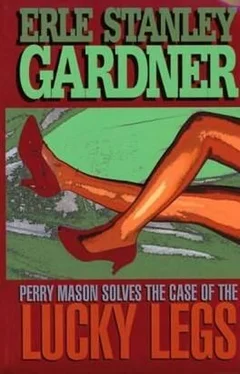"When do you think Bradbury first conceived the idea of murdering Patton?" the reporter asked.
"Some time ago," Perry Mason said. "He didn't lay his plans in detail, of course, until facts had shaped themselves so that he could make intelligent plans. He is a clever man, Bradbury, don't make any mistake about that. And then, of course, he had some lucky breaks, but he almost managed to put Dr. Doray in the death chair.
"No jury on earth would ever have believed that Dr. Doray was telling the truth when he said that the knife had mysteriously disappeared from his automobile, when he had parked it near the apartment house where Patton lived. Moreover, at any time that Dr. Doray became convinced Marjorie Clune might have committed the crime, he would have confessed."
"And you reasoned all this out without the aid of Thelma Bell's complete statement?" asked the reporter.
"I realized what must have happened," said Perry Mason slowly. "Thelma Bell never did tell me the truth. The first time I knew her complete story was when I saw the signed interview she had given the press, in which she stated exactly what had happened. How Patton, under the influence of liquor, had tried to lock her in the bedroom. How she had taken refuge in the bathroom, where she had given way to hysterics. She felt that Patton had been dragging her steadily downhill, through his exploitation of her physical beauty. She was tired and nervous and she gave way to hysterics.
"Bradbury, of course, heard her having hysterics as he came down the hall. He simply opened the door of the apartment and walked in. The time and the place were ideal for his purpose."
"But," one of the newspaper men said, "you confessed, did you not, Mr. Mason, to locking the door and then making false statements to the police?"
Perry Mason grinned, and there was a twinkle in his eyes.
"I did."
"Isn't that a crime?"
"It is not. A man can lie to the police or any one else just as much as he wants to. If his lies tend to shield a murderer, he may be guilty of compounding a felony. If he lies under oath, he is guilty of perjury. But, in this case, gentlemen, the lies tended to trap a murderer."
"But," the reporter pointed out, "weren't you taking risks?"
Perry Mason pushed back the chair from his desk, got to his feet and stood with shoulders squared, staring at the newspaper men with eyes that held a glint of amusement, and a glint of something that was not amusement. There was something almost of contempt in his tone when he spoke.
"Gentlemen," he said, "I always take risks. It's the way I play the game; I like it."
The telephone on Perry Mason's desk rang insistently. Della Street picked it up, listened for a few minutes and then left the room. Perry Mason turned to the reporters.
"Gentlemen," he said, "I think you have everything that you want now. I'm going to ask you to terminate this interview. I'm very tired."
"Okay, we understand," said one of the newspaper men. Perry Mason regarded Marjorie Clune and Bob Doray for a moment as if they were strangers. Then he jerked his head toward the door.
"What are you two children doing here?" he asked. "Your case is over. Get out. You've ceased to be a case, you're just a file. 'The Case of the Lucky Legs'—closed."
"Goodby, Mr. Mason," Marjorie said gently, "I never can thank you enough, you know that."
The End












